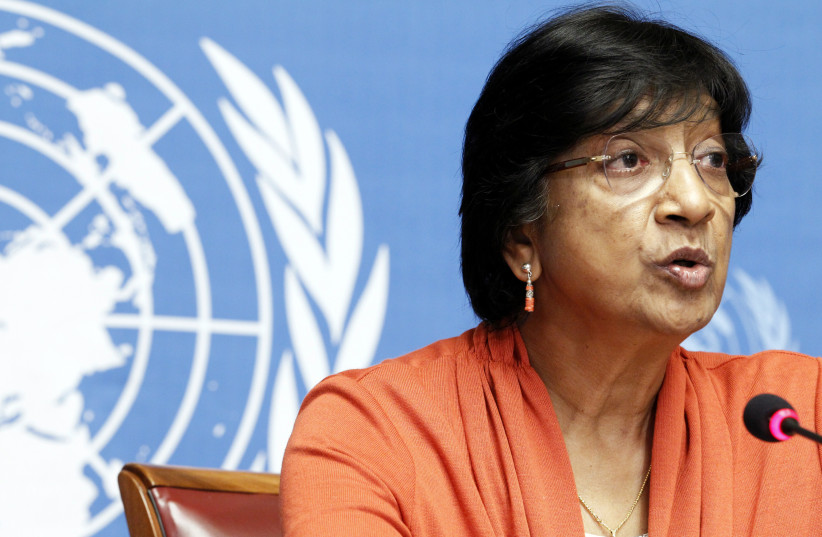A United Nations official leading an investigation into Israel was dropped from the schedule of a prominent international law conference in New York City, where she was due to receive an outstanding achievement award and deliver a keynote address.
The investigator, Navi Pillay, is a former UN High Commissioner for Human Rights and currently heads the UN Human Rights Council’s Commission of Inquiry into the Israeli-Palestinian conflict. She was slated to receive an Outstanding Achievement Award and speak at International Law Weekend, a gathering hosted from Oct. 19 through 21 by the International Law Association’s US branch.
Last month, however, dozens of centrist and right-wing Jewish groups protested the decision to honor Pillay, signing onto a letter urging law firms to drop their sponsorship of the event. The letter accused Pillay of working “to further a demonstrably discriminatory agenda against the Jewish people and the State of Israel.”
She will still receive the award
She will still receive the award, but in another setting, and will deliver her speech via webinar at a later date, according to an email the American branch of the law association sent to its board following what it called an “emergency meeting” held Oct. 11, in the wake of Hamas’ attack on Israel and the subsequent war.

According to the email, the award “will not be withdrawn,” and Pillay is listed as this year’s recipient on the association’s website. The email said the conference had attracted “significant attention and controversy” for the group and the event’s sponsors. The decision to “decouple” the award from the conference was made “both out of sensitivity to the outbreak of hostilities over the weekend and due to security concerns for Judge Navi Pillay and others participating.”
Pillay’s name was on the conference program a few days before Hamas’ Oct. 7 invasion of Israel, according to an archived web page. Her name does not appear on the current version of the program.
The International Law Association has 63 branches and more than 4,800 members, according to its website. The International Law Weekend, hosted by the association’s American branch, is one of the world’s leading annual conferences on international law. The association’s American branch and Pillay’s UN commission did not respond to requests for comment, and the association made no public statement regarding her removal from the program.
Four prominent law firms, including two headquartered in New York, were also removed from the conference’s list of sponsors ahead of the event, as was Yeshiva University’s Cardozo School of Law. In their letter protesting the event, the coalition of Jewish groups had asked three of the firms — Debevoise & Plimpton; Gibson, Dunn & Crutcher; and White & Case — to cut ties with the conference due to Pillay’s participation. The fourth firm was Winston & Strawn. The firms and Y.U.’s law school did not respond to requests for comment.
Israel, the United States, Jewish groups and other countries have accused Pillay’s commission and the Human Rights Council of bias against Israel. And Pillay has long been a bête noire for pro-Israel groups. As the UN High Commissioner for Human Rights from from September 2008 though August 2014, she often criticized Israel’s actions against Gaza, drawing rebuke from more than 100 members of Congress. The UN Human Rights Council and General Assembly both condemn Israel more than any other country.
Pillay’s Commission of Inquiry overwhelmingly blames Israel for its conflict with the Palestinians. Her recent reports, issued before Oct. 7, have not described Hamas as a terror group and rarely mention Israeli terror victims. The commission’s report released a year ago did not mention Hamas at all. Hamas applauded the commission last year.
One member of the three-person investigation, Miloon Kothari, said last year that the “Jewish lobby” controls social media and questioned why Israel was allowed membership in the UN Pillay defended Kothari, saying the comments had been “taken out of context.” After the incident, Pillay dismissed charges of antisemitism against the commission as “lies” and a diversion.
Pillay also oversaw the so-called Goldstone report into Israel’s military operation in Gaza in 2008-2009, which accused Israel of war crimes, including deliberately targeting civilians. The report’s lead author, Richard Goldstone, later retracted allegations made in the contentious report, but Pillay has defended the investigation and continues to cite it in her reports for the Commission of Inquiry.
Last year, Goldstone received the award that Pillay is receiving this year. A co-author of the Goldstone report, Christine Chinkin, is the chair of the International Law Association. Last year, Jewish groups criticized the conference for holding a panel on apartheid featuring several harsh critics of Israel.
Following the Oct. 7 attack, the commission said it was collecting evidence of war crimes committed by “all sides,” criticized “armed groups” from Gaza for killing civilians and condemned Israel’s response.
Pillay delivered her latest report, which was written before the current war, to the General Assembly on Tuesday. The report blames Israeli actions in east Jerusalem for Hamas rocket attacks, and criticizes Israel for taking military action against the terror group. The report was delivered on the same day that Israeli officials called for the resignation of UN Secretary-General Antonio Guterres after he said Hamas’ attack “did not happen in a vacuum.”
